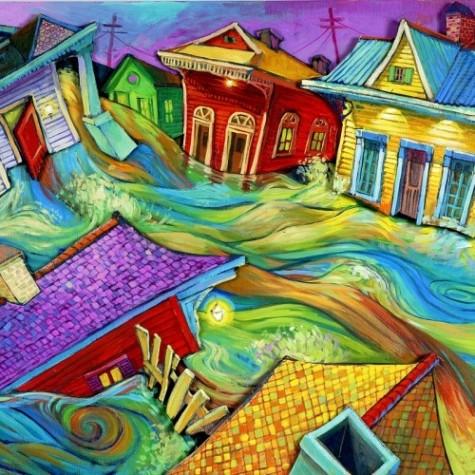Absurdity takes the stage in Loyola’s “Endgame”
September 19, 2014
Artwork by TERRANCE OSBORNE
Sitting in a trashcan for 90 minutes was the last thing Travis Daigle expected to do when he stepped on campus for the first time.
But now that Daigle, theatre arts freshman, has been cast in the leading role of Loyola’s production of “Endgame,” he is doing just that.
“When I heard that Loyola was doing ‘Endgame,’ I jumped at the opportunity to audition,” Daigle said. “I thought, ‘I’m going to audition, but she’s not going to cast me.’ It’s a tough show. But coming basically bursting onto the scene here was such a new experience that I was so readily excited for.”
“Endgame,” by Nobel Prize Winner Samuel Beckett, will premiere in Lower Depths Theatre on Sept. 26 and runs through Oct. 4. Laura Hope, associate professor of theatre arts, is directing the tragic comedy to kick off the 2014-2015 season.
The four-man cast has been preparing for the production since the first week of school and is working to present an accessible and meaningful show to the public next weekend.
Beckett’s script for “Endgame” paints an apocalyptic landscape coursing with dark humor and symbolic meaning that Hope said provided a platform for her New Orleans-inspired vision.
With Beckett’s plays finding their home in the theatre of the absurd, Hope embraced “Endgame’s” themes and found a contemporary mirror to reflect New Orleans’s current concerns, specifically focused on the environment.
“When Beckett wrote ‘Endgame,’ he was looking at a post-World-War- II, rise-of-the-Cold-War landscape where many cities had been flattened, environmental destruction had been huge, bombs had been dropped all around the world and the absurdity of why would we want to do that,” Hope said.
Keeping Beckett’s inspiration in mind, Hope said she found her own inspiration a little closer to home.
“I think we’re in a very different situation now, where the absurdity is there’s all this science out there and we have all of this everyday evidence to show us we’re losing a football field of land every day. Louisiana’s no longer shaped like a boot, yet we’re all in denial about it. To me, that’s absurd,” Hope said.
Hope said she has always found the “absurdity” of current environmental issues on par with Beckett’s vision, having made a similar connection back in the spring of 2010 when Loyola’s theatre department put on Beckett’s “Waiting for Godot,” centered around the theme of the then-recent BP Oil Spill.
Hope said she wishes to continue that reflection in this production of “Endgame.”
“We set ‘Endgame’ in the future where the whole place isn’t underwater yet, but between this perfect storm of what we have done to our environment and then global warming,” Hope said. “I think what Beckett was trying to do was, in pointing out the absurdity, he was hoping that people would wake up.”
Despite Beckett’s reputation as being difficult to interpret, the cast has worked with Shelby Kirby, theatre arts junior and the production’s dramaturge, to make the show accessible to everyone in attendance.
“Even though we are presenting our very unique ideas and our unique setting, there’s a degree of interpretation allowed for the audience members,” Kirby said. “They’re going to see what we are presenting and make of it what they will. Then they can come away from it maybe realizing something about themselves or about the world they live in that they didn’t quite see before.”
Hope said her production of “Endgame” is not meant to be a comedic portrayal of actors in trashcans speaking absurd lines, but rather an opportunity for the audience to walk away with an idea that the environmental issues that surround us are ever-present and need to be addressed.
“I think that by presenting the daily routine of this world in all of its absurdities, the hope is that you take a moment to look around and say, ‘This is actually a problem that we all need to be a part of the of the solution for,’” Hope said.
At the end of the day, Daigle said he is hopeful and excited about his first time on stage here at Loyola. Being a long-time fan of Beckett, he aspires to give a performance that will leave the audience thinking.
“It is such a heavy show that’s so metaphorical, and I hope the audience takes the time after the show to stop and really think about what they just watched because there’s a whole other level below the literal meaning and beyond what is said on stage,” Daigle said.







